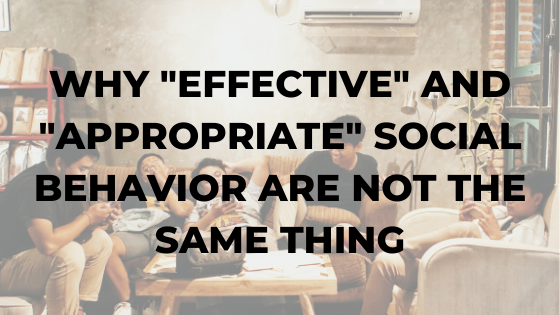A lot of the goals I see for pragmatic language center around “appropriate behavior”.
And a lot of the questions I get about social skills interventions are about how to write/track those goals effectively.
You may have noticed that a lot of your students in this population get reprimanded for acting out in class or not following expectations…
Or they’re struggling to make friends and hold conversations…
And the things that come so easily to some…just aren’t coming to them.
If you’re like most SLPs, you’re probably wondering what lies ahead for your students if you don’t address some of these issues NOW.
Will they ever be able to have functional, successful lives?
Will they be able to get a job? Have friends? Get married?
You know it’s up to you to lay the groundwork…but you also know it’s no small task.
So that brings us back to the initial question:
“How do we help them be more “appropriate” and follow the “social rules”?
What if getting them act APPROPRIATELY isn’t the goal?
In the video below, I share what to do instead.
As you watch the video, you’re going to realize why getting students to “act appropriate” isn’t always the best way to help them lead healthy, productive, successful lives.
I also share the right way to focus social-pragmatic intervention, including the 3 essential skills needed to function in social situations.
In the video above, I mention some live events that have already passed…
But don’t worry!
You can still learn how SLPs can support students with ASD and other social-cognitive challenges in the Social Language Roadmap.
I explain on this page here why this roadmap is the key to helping you:
…Quickly determine WHY your students struggle in certain social situations.
…Identify the key social skills they need to succeed.
…Write measurable, objective pragmatic goals that are easy to track.
…Choose evidence-based strategies to help meet those goals.
The bad news is that a lot of clinicians see poor progress with social skills interventions because they’ve been making at least one of these three mistakes I’ve described here.
The good news is that it’s possible for you to turn it around with the right roadmap, so you can help your students:
Successfully engage with peers and enjoy regular social interactions.
Have real connections and friendships with peers and navigate social gatherings effectively.
Understand how to navigate academic settings so they can meet necessary expectations and guidelines needed for future success.
Develop the skills they’ll need to find and keep a job as an adult, so they can support themselvs.
Empower them to be the best version of themselves so they can lead productive and happy lives.
You can learn more about how the Social Language Roadmap works here.

